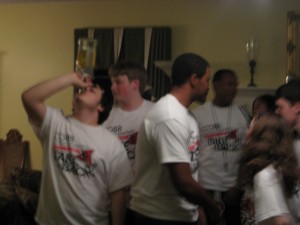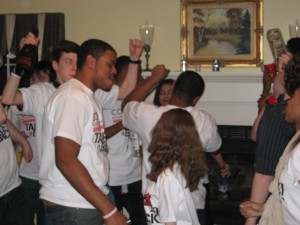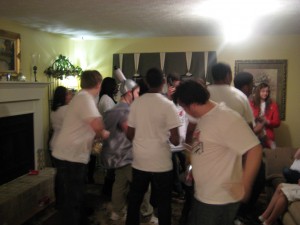 The suburban living room pulsed with the bass from loud music. The repetitive thud, thud, thud vibrated the floor and walls. The teens danced, arms raised in the air, waving bottles and glasses. They shouted, screamed, and called out to one another. The girls moved provocatively while the boys watched approvingly. One kid on his knees started chugging beer his friends poured through a hose. Two teens snuck away to a bedroom.
The suburban living room pulsed with the bass from loud music. The repetitive thud, thud, thud vibrated the floor and walls. The teens danced, arms raised in the air, waving bottles and glasses. They shouted, screamed, and called out to one another. The girls moved provocatively while the boys watched approvingly. One kid on his knees started chugging beer his friends poured through a hose. Two teens snuck away to a bedroom.
The kids were having the time of their lives. Then things started to go wrong. In the kitchen, two guys started fighting. The room tensed. The party was spiraling out of control.
The action happened quickly then. First, a girl collapsed on the kitchen floor. Kids hovered over her, not sure what to do or too drunk to care. And then a noise they all feared: a sharp knock on the door.
A voice from outside shouted, “police!” Kids dropped their plastic cups and liquor bottles and stampeded for the back door. The unconscious girl on the floor was forgotten as teens rushed to save themselves.
This scene took place at a private home in Marietta. The bottles and glasses were empty. The kids were acting to show adults what really goes on at an underage drinking party. Staged by the Cobb Alcohol Taskforce (CobbAT), a community organization working to eliminate teen access to alcohol, the demonstration was meant to get parents thinking about the consequences of serving teens alcohol.
The real show at this party was downstairs. There, the audience of parents had a chance to ask a police officer and two teenagers what really happens at house parties. The parents sat together on a long sofa, their faces troubled. Upstairs they had been smiling and enjoying the performance, but now, away from the play-acting and the charismatic teens, they were faced with the frightening possibilities of teen house parties.
After a moment, one parent spoke up: “So how do the kids get the alcohol?”
Through older friends, says Officer Wood of the Kennesaw, Ga, Police Department.
“Or they drink the liquor the parents already have in the house,” he added.
 The Internet is changing the way word spreads about a party. Typically, Officer Wood said, parties get out of hand because kids post about it on Facebook or Twitter. Pretty soon, lots of kids no one knows are showing up. Kids might think they are having a small party for some friends but then they lose control.
The Internet is changing the way word spreads about a party. Typically, Officer Wood said, parties get out of hand because kids post about it on Facebook or Twitter. Pretty soon, lots of kids no one knows are showing up. Kids might think they are having a small party for some friends but then they lose control.
“Half the kids don’t know the other half,” Officer Wood said.
Another parent wanted to know if kids were doing drugs when they drank.
“A lot of times there is marijuana and drinking at parties, but nothing harder,” one Youth Council member told them.
Sometimes, said another Youth Council member, the danger isn’t from kids drinking and doing drugs. Sometimes the danger is from kids staying sober on purpose. When everyone else is drunk and distracted the sober kid can steal from the house. Or take advantage of the girls who have been drinking.
According to Officer Wood, parents need to be around when their kids are having a party.
“These kids are going to get alcohol somehow, so you need to be there,” he said.
 And don’t let the kids leave the party, even to go out to their cars.
And don’t let the kids leave the party, even to go out to their cars.
“They could have alcohol in the car and sneak out to drink,” Officer Wood said.
[Read about this weekend's fatal drunk driving crash in Douglas County involving teens.]
“Parents worry and fret over marijuana and cocaine,” Cathy Finck, CobbAT Coordinator, told the parents, “But the real danger is alcohol.” She says the best strategy to prevent underage drinking is to limit availability.
While they are allowed to serve their own children it is against the law to serve the friends. Parents hosting a party face a $675 for each teenager caught drinking at their house.
“We want people to step up and say, ‘We won’t serve alcohol to minors,’” Fink said. “What’s needed is more vocal parental peer pressure.”
The CobbAT is asking parents to sign a pledge that they won’t serve alcohol to minors.
“We are supporting the young people who are saying, ‘stop buying alcohol for kids,’” Fink said. If you are going out of town, she adds, let the police know and they will gladly check up on you house. Or let your neighbors know.
“We’ve got to watch out for each other and each other’s kids,” Finck said.
The biggest problem for kids, according to Youth Council co-chair Natasha Walker, is a lack of education.
“Students think, ‘I don’t really care.’ But they aren’t thinking of the consequences,” such as auto accidents or alcohol poisoning, Natasha said.
What CobbAT wants you to remember is that kids can’t get alcohol on their own. Someone has to supply it for them.
Parents will often allow their kids to drink in their own homes. “They’ll think, ‘If my daughter is drinking in my house it’s not a problem.’ But it is,” Natasha adds.
CobbAT is gearing up for another night of performances on March 26. Here’s a link to the registration page.
Thanks so much! Wasn’t hard to do. They set a great scene and it was a wonderful event.
Great story! You describe the scene so well. Video was a nice touch too!